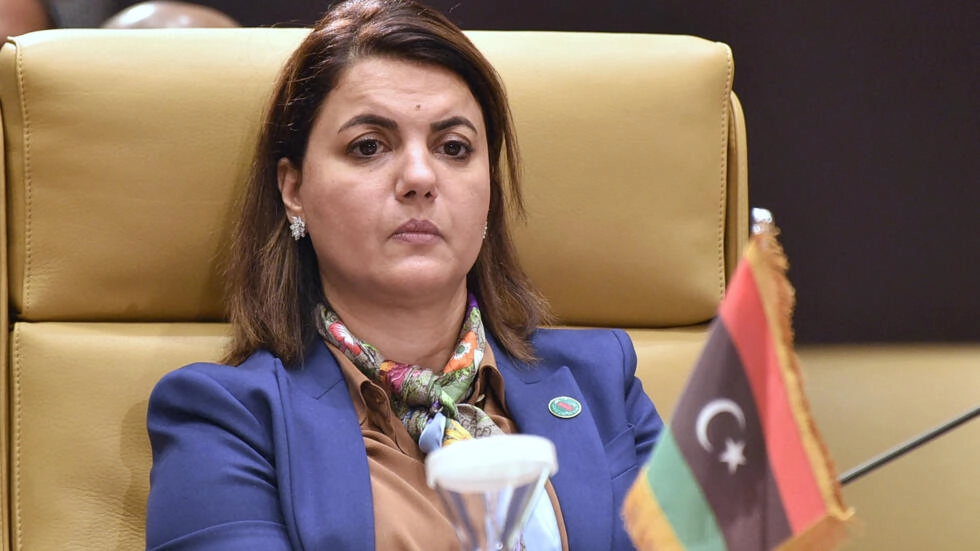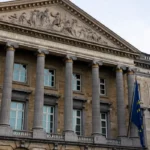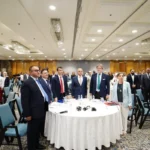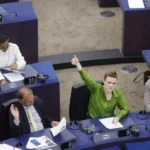Diplomatic scandal in Libya. The Prime Minister of the Libyan government based in Tripoli, Abdelhamid Dbeibah, finally sacked his head of diplomacy, Najla al-Mangoush, Monday evening, August 28, for having recently met his Israeli counterpart in Italy, an interview going against Libyan laws and of which he was necessarily aware, say analysts.
Abdelhamid Dbeibah had suspended Najla al-Mangoush the day before for having had an interview with Eli Cohen in Rome. Monday, during the day, the Prime Minister announced his “dismissal” from the Palestinian embassy in Tripoli, the diplomatic representation reported on its Facebook page.
The Prime Minister went there to express “Libyan support for the Palestinian cause”, saying that Najla al-Mangoush’s position “does not represent the government of Libya or its people”, according to the same source. Libya does not recognize Israel and opposes any normalization with the Jewish state.
Najla al-Mangoush’s fate was unknown on Monday. According to the Turkish news agency Anadolu, citing anonymous “security sources”, a Libyan government plane took her from Tripoli to Istanbul overnight from Sunday to Monday.
The Security Organ (OSI) of Mitiga airport, the only one operational in Tripoli, denied having authorized his departure abroad, “whether by the ordinary terminal or that of high personalities”. “The surveillance cameras will prove” that she did not leave via this airport, according to the OSI.
A scapegoat”
Before the Libyan Prime Minister “suspended” her and opened an “administrative investigation” against her on Sunday, Najla al-Mangoush’s ministry had described the interview with Eli Cohen as “incidental and unofficial”.
According to several Libya specialists, Abdelhamid Dbeibah – at the head of a government put in place within the framework of a peace process sponsored by the UN – had given his agreement to this interview, Najla al-Mangoush being a ” scapegoat”.
“The eastern parliament, (eastern strongman Khalifa) Haftar and Dbeibah hold her responsible for decisions in which they all participated,” Anas el-Gomati of the think tank Sadeq Institute told AFP.
According to him, “talks are underway to create a new interim government between the Dbeibah and Haftar families, negotiated in Abu Dhabi” instead of the elections initially scheduled for the end of 2021 in accordance with the UN process, but postponed indefinitely due to strong divisions. between the different camps in Libya.
For a year, two governments have been vying for power in the oil country, plunged into chaos since the fall of the regime of Muammar Gaddafi in 2011. There is that of Abdelhamid Dbeibah in the West, and that of the East supported by Marshal Khalifa Haftar.
According to Anas el-Gomati, to guarantee “American support [for an agreement between the two camps], pressure was exerted [on Libya] to adhere to the Abraham accords” of normalization between the Arab countries and Israel, of which are signatories the United Arab Emirates.
The Libyan Prime Minister is playing “his survival”
Jalel Harchaoui, also a specialist in Libya, also thinks of “a maneuver by Abdelhamid Dbeibah” to stay in power in the face of “pressure mounting at the UN and the United States to install a new government of technocrats to prepare for elections.
For Anas el-Gomati, Abdelhamid Dbeibah is playing “his survival” which “depends above all on the relations and alliances he maintains beyond the Libyan borders with powerful regional players”. “Tel Aviv’s support for Haftar is no secret,” he said, calling Israel’s announcement of the meeting “strategic” because “intended to tip the scales in favor of Haftar, cornering Dbeibah”.
The Israeli Ministry of Foreign Affairs denied on Monday being at the origin of this “leak” of information.
The idea is, according to the expert, either to “push Dbeibah to give up power, or to force him into a compromise with the Haftar camp via the secret channel of Abu Dhabi”.
Abdelhamid Dbeibah “had the temptation to make a coup in terms of diplomacy, but it failed because he did not correctly assess the risk that the population would focus on him [and not on Najla al-Mangoush]”, says specialist Jalel Harchaoui.
Protests erupted in Tripoli and several cities on Sunday, and the prime minister’s house was attacked. Groups of young people cut roads, burned tires and waved the Palestinian flag. “There is a real feeling of outrage among the population at Israel’s policies towards the Palestinians,” explains Jalel Harchaoui.
In Libya, any relationship with Israel, its nationals or any entity representing it is liable to criminal prosecution with a prison sentence of three to ten years, under a law dating from 1957.
This article is originally published on france24.com







